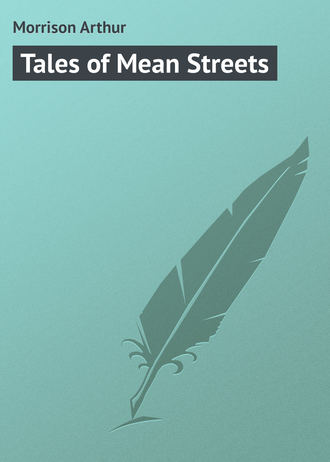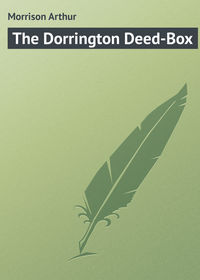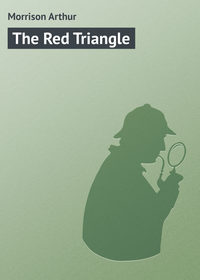 полная версия
полная версияTales of Mean Streets
"'Ulloo, Lizer! Where are y' a-comin' to? If I 'adn't laid 'old o' ye – !" But here Billy Chope arrived to demand what the 'ell Sam Cardew was doing with his gal. Now Sam was ever readier for a fight than Billy was; but the sum of Billy's half-pints was large: wherefore the fight began. On the skirt of an hilarious ring Lizerunt, after some small outcry, triumphed aloud. Four days before, she had no bloke; and here she stood with two, and those two fighting for her! Here in the public gaze, on the Flats! For almost five minutes she was Helen of Troy.
And in much less time Billy tasted repentance. The haze of half-pints was dispelled, and some teeth went with it. Presently, whimpering and with a bloody muzzle, he rose and made a running kick at the other. Then, being thwarted in a bolt, he flung himself down; and it was like to go hard with him at the hands of the crowd. Punch you may on Wanstead Flats, but execration and worse is your portion if you kick anybody except your wife. But, as the ring closed, the helmets of two policemen were seen to be working in over the surrounding heads, and Sam Cardew, quickly assuming his coat, turned away with such an air of blamelessness as is practicable with a damaged eye; while Billy went off unheeded in an opposite direction.
Lizerunt and her new bloke went the routine of half-pints and merry-go-rounds, and were soon on right thumping terms; and Lizerunt was as well satisfied with the issue as she was proud of the adventure. Billy was all very well; but Sam was better. She resolved to draw him for a feathered hat before next bank holiday. So the sun went down on her and her bloke hanging on each other's necks and straggling toward the Romford Road with shouts and choruses. The rest was tram-car, Bow Music Hall, half-pints, and darkness.
Billy took home his wounds, and his mother, having moved his wrath by asking their origin, sought refuge with a neighbor. He accomplished his revenge in two instalments. Two nights later Lizerunt was going with a jug of beer; when somebody sprang from a dark corner, landed her under the ear, knocked her sprawling, and made off to the sound of her lamentations. She did not see who it was, but she knew; and next day Sam Cardew was swearing he'd break Billy's back. He did not, however, for that same evening a gang of seven or eight fell on him with sticks and belts. (They were Causeway chaps, while Sam was a Brady's Laner, which would have been reason enough by itself, even if Billy Chope had not been one of them.) Sam did his best for a burst through and a run, but they pulled and battered him down; and they kicked him about the head, and they kicked him about the belly; and they took to their heels when he was speechless and still.
He lay at home for near four weeks, and when he stood up again it was in many bandages. Lizerunt came often to his bedside, and twice she brought an orange. On these occasions there was much talk of vengeance. But the weeks went on. It was a month since Sam had left his bed; and Lizerunt was getting a little tired of bandages. Also, she had begun to doubt and to consider bank holiday – scarce a fortnight off. For Sam was stone-broke, and a plush hat was further away than ever. And all through the later of these weeks Billy Chope was harder than ever on his mother, and she, well knowing that if he helped her by taking home he would pocket the money at the other end, had taken to finishing and delivering in his absence, and, threats failing to get at the money, Billy Chope was impelled to punch her head and gripe her by the throat.
There was a milliner's window, with a show of nothing but fashionable plush-and-feather hats, and Lizerunt was lingering hereabouts one evening, when some one took her by the waist, and some one said, "Which d'yer like, Lizer? – The yuller un?"
Lizerunt turned and saw that it was Billy. She pulled herself away, and backed off, sullen and distrustful. "Garn," she said.
"Straight," said Billy, "I'll sport yer one. – No kid, I will."
"Garn," said Lizerunt once more. "Wot yer gittin' at now?"
But presently, being convinced that bashing wasn't in it, she approached less guardedly; and she went away with a paper bag and the reddest of all the plushes and the bluest of all the feathers; a hat that challenged all the Flats the next bank holiday, a hat for which no girl need have hesitated to sell her soul. As for Billy, why, he was as good as another; and you can't have everything; and Sam Cardew, with his bandages and his grunts and groans, was no great catch after all.
This was the wooing of Lizerunt: for in a few months she and Billy married under the blessing of a benignant rector, who periodically set aside a day for free weddings, and, on principle, encouraged early matrimony. And they lived with Billy's mother.
II. LIZER'S FIRST
When Billy Chope married Lizerunt there was a small rejoicing. There was no wedding-party; because it was considered that what there might be to drink would be better in the family. Lizerunt's father was not, and her mother felt no interest in the affair; not having seen her daughter for a year, and happening, at the time, to have a month's engagement in respect of a drunk and disorderly. So that there were but three of them; and Billy Chope got exceedingly tipsy early in the day; and in the evening his bride bawled a continual chorus, while his mother, influenced by that unwonted quartern of gin the occasion sanctioned, wept dismally over her boy, who was much too far gone to resent it.
His was the chief reason for rejoicing. For Lizerunt had always been able to extract ten shillings a week from the pickle factory, and it was to be presumed that as Lizer Chope her earning capacity would not diminish; and the wages would make a very respectable addition to the precarious revenue, depending on the mangle, that Billy extorted from his mother. As for Lizer, she was married. That was the considerable thing; for she was but a few months short of eighteen, and that, as you know, is a little late.
Of course there were quarrels very soon; for the new Mrs. Chope, less submissive at first than her mother-in-law, took a little breaking in, and a liberal renewal of the manual treatment once applied in her courting days. But the quarrels between the women were comforting to Billy: a diversion and a source of better service.
As soon as might be, Lizer took the way of womankind. This circumstance brought an unexpected half-crown from the evangelical rector who had married the couple gratis; for recognizing Billy in the street by accident, and being told of Mrs. Chope's prospects, as well as that Billy was out of work (a fact undeniable), he reflected that his principles did on occasion lead to discomfort of a material sort. And Billy, to whose comprehension the half-crown opened a new field of receipt, would doubtless have long remained a client of the rector, had not that zealot hastened to discover a vacancy for a warehouse porter, the offer of presentation whereunto alienated Billy Chope forever. But there were meetings and demonstrations of the Unemployed; and it was said that shillings had been given away; and, as being at a meeting in a street was at least as amusing as being in a street where there was no meeting, Billy often went, on the off chance. But his lot was chiefly disappointment: wherefore he became more especially careful to furnish himself ere he left home.
For certain weeks cash came less freely than ever from the two women. Lizer spoke of providing for the necessities of the expected child: a manifestly absurd procedure, as Billy pointed out, since, if they were unable to clothe or feed it, the duty would fall on its grandmother. That was law, and nobody could get over it. But even with this argument, a shilling cost him many more demands and threats than it had used, and a deal more general trouble.
At last Lizer ceased from going to the pickle factory, and could not even help Billy's mother at the mangle for long. This lasted for near a week, when Billy, rising at ten with a bad mouth, resolved to stand no nonsense, and demanded two shillings.
"Two bob? Wot for?" Lizer asked.
"'Cos I want it. None o' yer lip."
"Ain't got it," said Lizer sulkily.
"That's a bleed'n' lie."
"Lie yerself."
"I'll break y' in 'arves, ye blasted 'eifer!" He ran at her throat and forced her back over a chair. "I'll pull yer face auf! If y' don't give me the money, gawblimy, I'll do for ye!"
Lizer strained and squalled. "Le' go! You'll kill me an' the kid too!" she grunted hoarsely. Billy's mother ran in and threw her arms about him, dragging him away. "Don't, Billy," she said, in terror. "Don't, Billy – not now! You'll get in trouble. Come away! She might go auf, an' you'd get in trouble!"
Billy Chope flung his wife over and turned to his mother. "Take yer 'ands auf me," he said: "go on, or I'll gi' ye somethin' for yerself." And he punched her in the breast by way of illustration.
"You shall 'ave what I've got, Billy, if it's money," the mother said. "But don't go an' git yerself in trouble, don't. Will a shillin' do?"
"No, it won't. Think I'm a bloomin' kid? I mean 'avin' two bob this mornin'."
"I was a-keepin' it for the rent, Billy, but – "
"Yus; think o' the bleed'n' lan'lord 'fore me, doncher?" And he pocketed the two shillings. "I ain't settled with you yut, my gal," he added to Lizer; "mikin' about at 'ome an' 'idin' money. You wait a bit."
Lizer had climbed into an erect position, and, gravid and slow, had got as far as the passage. Mistaking this for a safe distance, she replied with defiant railings. Billy made for her with a kick that laid her on the lower stairs, and, swinging his legs round his mother as she obstructed him, entreating him not to get in trouble, he attempted to kick again in a more telling spot. But a movement among the family upstairs and a tap at the door hinted of interference, and he took himself off.
Lizer lay doubled upon the stairs, howling: but her only articulate cry was, "Gawd 'elp me, it's comin'!"
Billy went to the meeting of the Unemployed, and cheered a proposal to storm the Tower of London. But he did not join the procession following a man with a handkerchief on a stick, who promised destruction to every policeman in his path: for he knew the fate of such processions. With a few others, he hung about the nearest tavern for a while, on the chance of the advent of a flush sailor from St. Katharine's, disposed to treat out-o'-workers. Then he went alone to a quieter beer-house and took a pint or two at his own expense. A glance down the music-hall bills hanging in the bar having given him a notion for the evening, he bethought himself of dinner, and made for home.
The front door was open, and in the first room, where the mangle stood, there were no signs of dinner. And this was at three o'clock! Billy pushed into the room behind, demanding why.
"Billy," Lizer said faintly from her bed, "look at the baby!"
Something was moving feebly under a flannel petticoat. Billy pulled the petticoat aside, and said, "That? Well, it is a measly snipe." It was a blind, hairless homunculus, short of a foot long, with a skinny face set in a great skull. There was a black bruise on one side from hip to armpit. Billy dropped the petticoat and said, "Where's my dinner?"
"I dunno," Lizer responded hazily. "Wot's the time?"
"Time? Don't try to kid me. You git up; go on. I want my dinner."
"Mother's gittin' it, I think," said Lizer. "Doctor had to slap 'im like anythink 'fore 'e'd cry. 'E don't cry now much. 'E – "
"Go on; out ye git. I do' want no more damn jaw. Git my dinner."
"I'm a-gittin' of it, Billy," his mother said, at the door. She had begun when he first entered. "It won't be a minute."
"You come 'ere; y' ain't alwis s' ready to do 'er work, are ye? She ain't no call to stop there no longer, an' I owe 'er one for this mornin'. Will ye git out, or shall I kick ye?"
"She can't, Billy," his mother said. And Lizer snivelled and said, "You're a damn brute. Y' ought to be bleedin' well booted."
But Billy had her by the shoulders and began to haul; and again his mother besought him to remember what he might bring upon himself. At this moment the doctor's dispenser, a fourth-year London Hospital student of many inches, who had been washing his hands in the kitchen, came in. For a moment he failed to comprehend the scene. Then he took Billy Chope by the collar, hauled him pell-mell along the passage, kicked him (hard) into the gutter, and shut the door.
When he returned to the room, Lizer, sitting up and holding on by the bed-frame, gasped hysterically: "Ye bleedin' makeshift, I'd 'ave yer liver out if I could reach ye! You touch my 'usband, ye long pisenin' 'ound you! Ow!" And, infirm of aim, she flung a cracked teacup at his head. Billy's mother said, "Y' ought to be ashamed of yourself, you low blaggard. If 'is father was alive 'e'd knock yer 'ead auf. Call yourself a doctor – a passel o' boys! – Git out! Go out o' my 'ouse, or I'll give y' in charge!"
"But – why, hang it, he'd have killed her." Then to Lizer, "Lie down."
"Sha'n't lay down. Keep auf! if you come near me I'll corpse ye. You go while ye're safe!"
The dispenser appealed to Billy's mother. "For God's sake make her lie down. She'll kill herself. I'll go. Perhaps the doctor had better come." And he went: leaving the coast clear for Billy Chope to return and avenge his kicking.
III. A CHANGE OF CIRCUMSTANCES
Lizer was some months short of twenty-one when her third child was born. The pickle factory had discarded her some time before, and since that her trade had consisted in odd jobs of charing. Odd jobs of charing have a shade the better of a pickle factory in the matter of respectability, but they are precarious, and they are worse paid at that. In the East End they are sporadic and few. Moreover, it is in the household where paid help is a rarity that the bitterness of servitude is felt. Also, the uncertainty and irregularity of the returns were a trouble to Billy Chope. He was never sure of having got them all. It might be ninepence, or a shilling, or eighteenpence. Once or twice, to his knowledge, it had been half-a-crown, from a chance job at a doctor's or a parson's, and once it was three shillings. That it might be half-a-crown or three shillings again, and that some of it was being kept back, was ever the suspicion evoked by Lizer's evening homing. Plainly, with these fluctuating and uncertain revenues, more bashing than ever was needed to insure the extraction of the last copper; empty-handedness called for bashing on its own account; so that it was often Lizer's hap to be refused a job because of a black eye.
Lizer's self was scarcely what it had been. The red of her cheeks, once bounded only by the eyes and the mouth, had shrunk to a spot in the depth of each hollow; gaps had been driven in her big white teeth; even the snub nose had run to a point, and the fringe hung dry and ragged, while the bodily outline was as a sack's. At home, the children lay in her arms or tumbled at her heels, puling and foul. Whenever she was near it, there was the mangle to be turned; for lately Billy's mother had exhibited a strange weakness, sometimes collapsing with a gasp in the act of brisk or prolonged exertion, and often leaning on whatever stood hard by and grasping at her side. This ailment she treated, when she had twopence, in such terms as made her smell of gin and peppermint; and more than once this circumstance had inflamed the breast of Billy her son, who was morally angered by this boozing away of money that was really his.
Lizer's youngest, being seven or eight months old, was mostly taking care of itself, when Billy made a welcome discovery after a hard and pinching day. The night was full of blinding wet, and the rain beat on the window as on a drum. Billy sat over a small fire in the front room smoking his pipe, while his mother folded clothes for delivery. He stamped twice on the hearth, and then, drawing off his boot, he felt inside it. It was a nail. The poker-head made a good anvil, and, looking about for a hammer, Billy bethought him of a brick from the mangle. He rose, and, lifting the lid of the weight-box, groped about among the clinkers and the other ballast till he came upon a small but rather heavy paper parcel. "'Ere – wot's this?" he said, and pulled it out.
His mother, whose back had been turned, hastened across the room, hand to breast (it had got to be her habit). "What is it, Billy?" she said. "Not that: there's nothing there. I'll get anything you want, Billy." And she made a nervous catch at the screw of paper. But Billy fended her off, and tore the package open. It was money, arranged in little columns of farthings, halfpence, and threepenny pieces, with a few sixpences, a shilling or two, and a single half-sovereign. "O," said Billy, "this is the game, is it? – 'idin' money in the mangle! Got any more?" And he hastily turned the brickbats.
"No, Billy, don't take that – don't!" implored his mother. "There'll be some money for them things when they go 'ome – 'ave that. I'm savin' it, Billy, for something partic'ler: s'elp me Gawd, I am, Billy."
"Yus," replied Billy, raking diligently among the clinkers, "savin' it for a good ol' booze. An' now you won't 'ave one. Bleedin' nice thing, 'idin' money away from yer own son!"
"It ain't for that, Billy – s'elp me, it ain't; it's case anythink 'appens to me. On'y to put me away decent, Billy, that's all. We never know, an' you'll be glad of it t'elp bury me if I should go any time – "
"I'll be glad of it now," answered Billy, who had it in his pocket; "an' I've got it. You ain't a dyin' sort, you ain't; an' if you was, the parish 'ud soon tuck you up. P'raps you'll be straighter about money after this."
"Let me 'ave some, then, – you can't want it all. Give me some, an' then 'ave the money for the things. There's ten dozen and seven, and you can take 'em yerself if ye like."
"Wot – in this 'ere rain? Not me! I bet I'd 'ave the money if I wanted it without that. 'Ere – change these 'ere fardens at the draper's wen you go out: there's two bob's worth an' a penn'orth; I don't want to bust my pockets wi' them."
While they spoke Lizer had come in from the back room. But she said nothing: she rather busied herself with a child she had in her arms. When Billy's mother, despondent and tearful, had tramped out into the rain with a pile of clothes in an oilcloth wrapper, she said sulkily, without looking up, "You might 'a' let 'er kep' that; you git all you want."
At another time this remonstrance would have provoked active hostilities; but now, with the money about him, Billy was complacently disposed. "You shutcher 'ead," he said, "I got this, any'ow. She can make it up out o' my rent if she likes." This last remark was a joke, and he chuckled as he made it. For Billy's rent was a simple fiction, devised, on the suggestion of a smart canvasser, to give him a parliamentary vote.
That night Billy and Lizer slept, as usual, in the bed in the back room, where the two younger children also were. Billy's mother made a bedstead nightly with three chairs and an old trunk in the front room by the mangle, and the eldest child lay in a floor-bed near her. Early in the morning Lizer awoke at a sudden outcry of the little creature. He clawed at the handle till he opened the door, and came staggering and tumbling into the room with screams of terror. "Wring 'is blasted neck," his father grunted sleepily. "Wot's the kid 'owlin' for?"
"I's 'f'aid o' g'anny – I's 'f'aid o' g'anny!" was all the child could say; and when he had said it, he fell to screaming once more.
Lizer rose and went to the next room; and straightway came a scream from her also. "O – O – Billy! Billy! O my Gawd! Billy, come 'ere!"
And Billy, fully startled, followed in Lizer's wake. He blundered in, rubbing his eyes, and saw.
Stark on her back in the huddled bed of old wrappers and shawls lay his mother. The outline of her poor face – strained in an upward stare of painful surprise – stood sharp and meagre against the black of the grate beyond. But the muddy old skin was white, and looked cleaner than its wont, and many of the wrinkles were gone.
Billy Chope, half-way across the floor, recoiled from the corpse, and glared at it pallidly from the doorway.
"Good Gawd!" he croaked faintly, "is she dead?"
Seized by a fit of shuddering breaths, Lizer sank on the floor, and, with her head across the body, presently broke into a storm of hysterical blubbering, while Billy, white and dazed, dressed hurriedly and got out of the house. He was at home as little as might be until the coroner's officer carried away the body two days later. When he came for his meals, he sat doubtful and querulous in the matter of the front room door's being shut. The dead once clear away, however, he resumed his faculties, and clearly saw that here was a bad change for the worse. There was the mangle, but who was to work it? If Lizer did, there would be no more charing jobs – a clear loss of one-third of his income. And it was not at all certain that the people who had given their mangling to his mother would give it to Lizer. Indeed, it was pretty sure that many would not, because mangling is a thing given by preference to widows, and many widows of the neighborhood were perpetually competing for it. Widows, moreover, had the first call in most odd jobs whereunto Lizer might turn her hand: an injustice whereon Billy meditated with bitterness.
The inquest was formal and unremarked, the medical officer having no difficulty in certifying a natural death from heart disease. The bright idea of a collection among the jury, which Billy communicated, with pitiful representations, to the coroner's officer, was brutally swept aside by that functionary, made cunning by much experience. So the inquest brought him nought save disappointment and a sense of injury…
The mangling orders fell away as suddenly and completely as he had feared: they were duly absorbed among the local widows. Neglect the children as Lizer might, she could no longer leave them as she had done. Things, then, were bad with Billy, and neither threats nor thumps could evoke a shilling now.
It was more than Billy could bear: so that, "'Ere," he said one night, "I've 'ad enough o' this. You go and get some money; go on."
"Go an' git it?" replied Lizer. "O yus. That's easy, ain't it? 'Go an' git it,' says you. 'Ow?"
"Any'ow – I don't care. Go on."
"Wy," replied Lizer, looking up with wide eyes, "d'ye think I can go an' pick it up in the street?"
"Course you can. Plenty others does, don't they?"
"Gawd, Billy … wot d'ye mean?"
"Wot I say; plenty others does it. Go on – you ain't so bleed'n' innocent as all that. Go an' see Sam Cardew. Go on – 'ook it."
Lizer, who had been kneeling at the child's floor-bed, rose to her feet, pale-faced and bright of eye.
"Stow kiddin', Billy," she said. "You don't mean that. I'll go round to the fact'ry in the mornin': p'raps they'll take me on temp'ry."
"Damn the fact'ry."
He pushed her into the passage. "Go on – you git me some money, if ye don't want yer bleed'n' 'ead knocked auf."
There was a scuffle in the dark passage, with certain blows, a few broken words, and a sob. Then the door slammed, and Lizer Chope was in the windy street.
WITHOUT VISIBLE MEANS
All East London idled, or walked in a procession, or waylaid and bashed, or cried in an empty kitchen: for it was the autumn of the Great Strikes. One army of men, having been prepared, was ordered to strike – and struck. Other smaller armies of men, with no preparation, were ordered to strike to express sympathy – and struck. Other armies still were ordered to strike because it was the fashion – and struck. Then many hands were discharged because the strikes in other trades left them no work. Many others came from other parts in regiments to work, but remained to loaf in gangs: taught by the example of earlier regiments, which, the situation being explained (an expression devised to include mobbings and kickings and flingings into docks), had returned whence they came. So that East London was very noisy and largely hungry; and the rest of the world looked on with intense interest, making earnest suggestions, and comprehending nothing. Lots of strikers, having no strike pay and finding little nourishment in processions, started off to walk to Manchester, Birmingham, Liverpool, or Newcastle, where work might be got. Along the Great North Road such men might be seen in silent companies of a dozen or twenty, now and again singly or in couples. At the tail of one such gang, which gathered in the Burdett Road and found its way into the Enfield Road by way of Victoria Park, Clapton, and Stamford Hill, walked a little group of three: a voluble young man of thirty, a stolid workman rather older, and a pale, anxious little fellow, with a nasty spasmic cough and a canvas bag of tools.






